In Soviet-era movies, as the heroes worked they often sang about the joy of labor, their pride in the Land of Soviets, and the wise policy of the Communist Party. “We shall carry the flame of our soul, the banner of our country, onward through worlds and centuries!” sang the actress Lyubov Orlova as she worked simultaneously on dozens of looms in the movie “Bright Path” (1940).
Orlova’s song was called “March of Enthusiasts.” By then many Muscovites grimaced when they heard the word “enthusiasts.” One of the capital’s major thoroughfares had been recently renamed the Highway of Enthusiasts. But older Muscovites remembered its old name: the Vladimir Road. Under the tsars it was known for the columns of prisoners who were sent off on this road to prisons and exile. At the end of the 1930s, the Vladimir Central Prison — a famous transit jail — was filled with new political “enthusiasts.”

But it turns out that this tradition of “singing while we work” appeared in Russia long before the Communists. Memoirs are filled with lines like: “Ah, what songs our peasants had! Nowhere are there more beautiful songs!” Whether there are or not is a debatable question. But why people sang is very clear, as described in the newspaper “Vladimirskie Gubernskie Vedomosti” in 1850. To keep the peasant girls from eating the harvest as they worked, they had to sing so that their mouths were always wide open — and empty.
“Cherry picking is done by poor women and girls, who are usually paid 13 kopecks in silver a day. They climb ladders to pick the berries off the high branches. When their baskets are full, they sing as they leave the orchard under the supervision of the clerk. That’s the way they walk through the streets to the warehouse. And since the pickers are hungry and ready to eat all the cherries they are carrying, the prudent wardens, fearing for their jobs, make them sing at the top of their lungs.”

In Suzdal the local sweet cherries were mostly used for making jams and a kind of cherry brandy. They were also pickled in vinegar for the winter, as advised by the renowned cookbook author Yelena Molokhovets: “Juice cherries and fill a bottle half with the juice and add the same amount of Rhine (grape) vinegar. In each bottle put also 1.5 cups of honey or 2 cups of sugar and spices. Boil this syrup, let it cool and pour it over whole cherries. Cork the jars and keep them in the cold.” The only thing striking about this recipe is the size of the bottle. It was probably the “Russian quarter” (1/4 of a bucket), i.e. about 3 liters.
But in Russian history sour and sweet cherries have not always been a source of joy; they have also played a role in darker episodes over the centuries. Most people have read Alexander Pushkin’s story “The Shot.” But few people know that its plot is largely biographical: one of the duelists was the poet himself. When Pushkin was in Chişinău (now the capital of Moldova), he got into an argument about a card game with another officer.
As they were playing Pushkin saw that Warrant Officer Zubov was cheating by switching cards. Pushkin lost the game but later laughed about it with his friends, saying that you don’t pay up when you lose that way. His comment got around, and Zubov challenged him to a duel.
According to witnesses, during the duel Pushkin was absolutely calm and fearless. On the appointed day, he strolled up to the place where the duel was to be held, holding a cap in his hands. When he got closer, his opponent’s seconds could see that this cap was full of sweet cherries.

As the dishonored officer aimed his pistol at him, Pushkin stood calmly eating the cherries and tossing the pits at Zubov. Perhaps Pushkin’s defiant state of utter calm or perhaps the aroma of the sweet cherries threw off the duelist. He fired at Pushkin, but his hand trembled and the bullet went wide. “Are you satisfied?” Pushkin asked and withdrew without firing a shot.
Sweet cherries are a bit of a mystery in Russian cuisine. There is nothing more delicious than these cherries fresh off the tree, but there are only a very few recipes for them, while there are dozens of recipes for sour cherries. But perhaps it’s not a mystery at all. Maybe people just ate them fresh and didn’t bother with ways to cook and preserve them?
Occasionally, however, there is a brief reference to sweet cherries in old Russian cookbooks. For example, in the 1853 “Almanac of Gastronomes” the famous chef Ignatius Radetsky lists the dishes served at a ceremonial dinner including “pickled sour and sweet cherries.”
Radetsky doesn’t write a word about they were made — probably everyone knew. Today it is not so obvious. We tried to reconstruct the recipe, and are quite happy with the result.

Pickled Sweet Cherries
Ingredients
- 600 g (1 lb 4 oz) cherries (such as Bing, Ranier or Lambert)
- 200 ml (5/6 c) water
- 240 ml (1 c) white vinegar
- 160 g (5.5 oz) sugar
- 2 cinnamon sticks
- 4 pieces allspice
- 2 pieces anise
Instructions
- Wash the cherries, dry them and trim back the stalk.
- Mix the water, vinegar and sugar in a saucepan and bring to a boil to make the marinade.
- Place cinnamon, allspice and anise in jars. Arrange the cherries in the jars, being careful not to crush them.
- Pour the hot marinade over the cherries (leaving a head room of 1-1.5 cm), then lightly tap the jar on the countertop (on a towel) to remove air bubbles.
- Wipe the edge of the jar and seal the lids. Sterilize in boiling water for 10 minutes. Cool and store in a dark place. Can be left unsterilized and stored in the refrigerator.
- Ready to eat after 2 weeks.
- Serve with cheese, roast meats and any cold poultry. You can even sing while you eat!
Leave a Reply